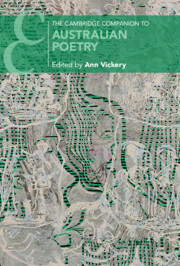Book contents
- The Cambridge Companion to Australian Poetry
- The Cambridge Companion to Australian Poetry
- Copyright page
- Contents
- Figures
- Contributors
- Acknowledgements
- Chronology
- Introduction
- Part I Change and Renewal
- Part II Networks
- Part III Authors
- Part IV Embodied Poetics
- 13 The Strength of Us as Women
- 14 “Country Snarled / in Borders”
- 15 Australian Poets in the Countries of Others
- 16 Writing the Body
- 17 Not the Poem Alone
- Part V Expanding Form
- Further Reading
- Index
- Cambridge Companions To …
- References
13 - The Strength of Us as Women
A Poetics of Relationality and Reckoning
from Part IV - Embodied Poetics
Published online by Cambridge University Press: 06 June 2024
- The Cambridge Companion to Australian Poetry
- The Cambridge Companion to Australian Poetry
- Copyright page
- Contents
- Figures
- Contributors
- Acknowledgements
- Chronology
- Introduction
- Part I Change and Renewal
- Part II Networks
- Part III Authors
- Part IV Embodied Poetics
- 13 The Strength of Us as Women
- 14 “Country Snarled / in Borders”
- 15 Australian Poets in the Countries of Others
- 16 Writing the Body
- 17 Not the Poem Alone
- Part V Expanding Form
- Further Reading
- Index
- Cambridge Companions To …
- References
Summary
Taking Kerry Reed-Gilbert’s anthology The Strength of Us as Women: Black Women Speak (2000) as touchstone, the chapter undertakes a conversation between two Aboriginal women poets from Narungga and Wiradjuri standpoints about the transformative power of Indigenous poetry and its significant contribution to literature in the world. Offering an alternative to the essay, the authors discuss embodied engagements with the colonial archive and the theme of relationality that informs so much of Aboriginal writing. The chapter considers the potential of poetry to be both an affective tool and literary intervention. It outlines the methods of Gathering and Archival-Poetic praxis as ways to explore the counter-narrative potential of poetry. In considering the role of memory work and memory-making, the authors also discuss blood memory and body memory.
- Type
- Chapter
- Information
- The Cambridge Companion to Australian Poetry , pp. 219 - 235Publisher: Cambridge University PressPrint publication year: 2024

